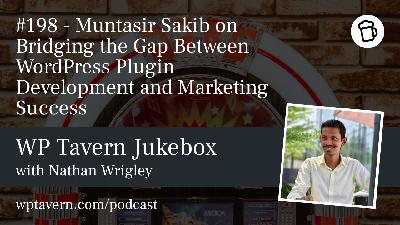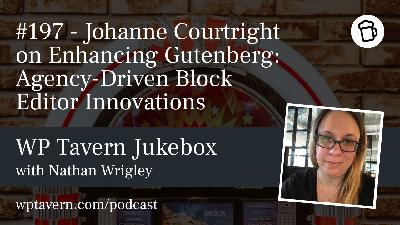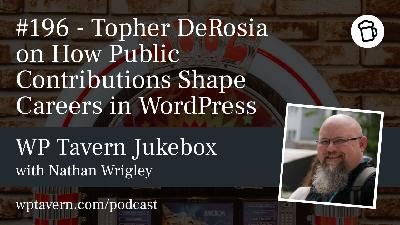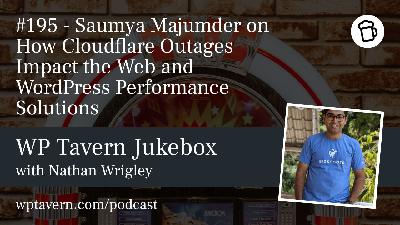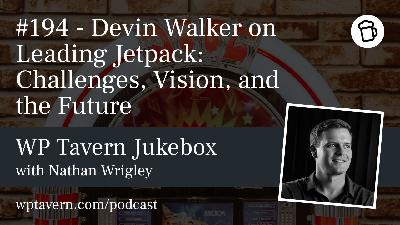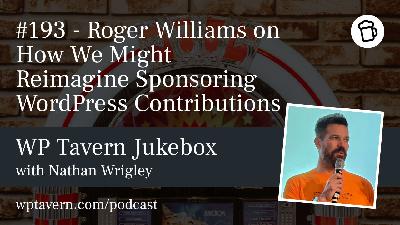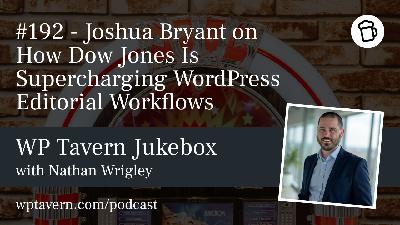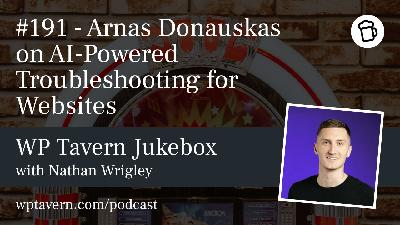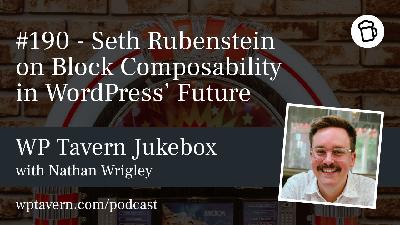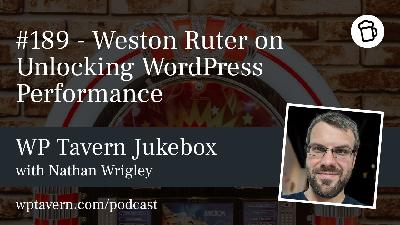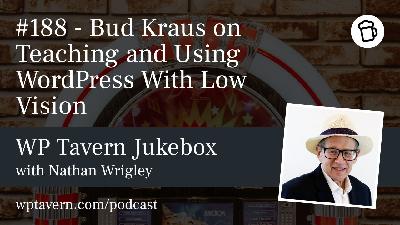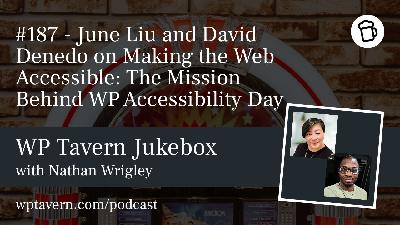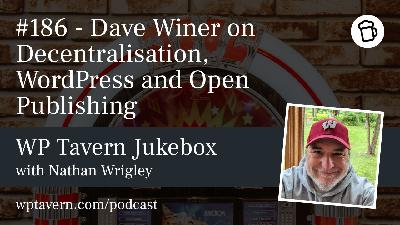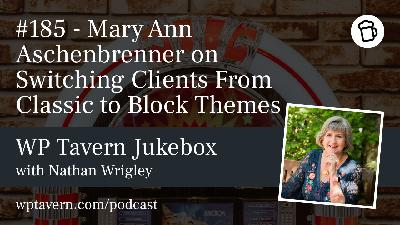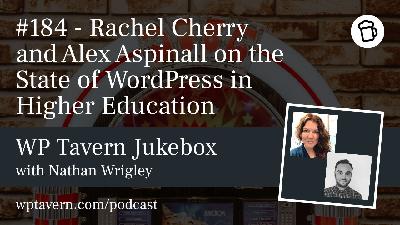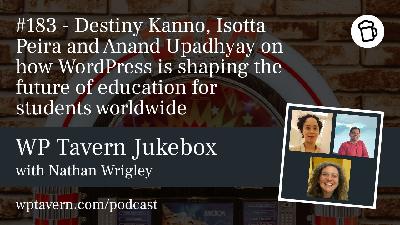Discover Jukebox
Jukebox

Jukebox
Author: Nathan Wrigley
Subscribed: 2Played: 75Subscribe
Share
© from 2021 - WordPress Tavern
Description
The WP Tavern Jukebox is a podcast for the WordPress community. We interview people who are pushing change in how WordPress evolves. Plugins, Blocks, Themes, Community, Events, Accessibility and Diversity; we try to cover all the bases. Subscribe to be updated when we bring you new content.
204 Episodes
Reverse
In this episode of WP Tavern, Nathan Wrigley chats with Charly Leetham about her journey as a digital nomad using WordPress. Charly shares how evolving technology allowed her to build a flexible, location-independent tech support business. She discusses the freedoms and challenges of living on the road, remote work essentials like Starlink for internet access, and how she supports clients with their tech and websites. The conversation highlights both practical insights and the personal rewards of a nomadic, tech-enabled lifestyle. If you’ve ever imagined trading your desk for the open road, or wondered what’s technologically and personally possible as a remote WordPress worker, this episode is for you.
In this episode of the WP Tavern Jukebox podcast, Nathan Wrigley and Marc Benzakein reminisce about the early days of the internet, sharing personal stories from dial-up and BBS boards to today’s always-connected world. They discuss how internet use shifted from a niche hobby for tech enthusiasts to an essential part of daily life, touching on both its remarkable benefits, like accessible information and levelling the business playing field, and its challenges, such as tech overload and lost downtime. The episode also reflects on generational differences in technology use and the possibility of a pushback against constant connectivity among younger people.
In this episode, Nathan Wrigley talks with Corey Maass about how AI tools have transformed web development, especially for client projects. Corey Maass shares his ever-changing tech stack, the impact of AI on productivity and creativity, and how tools like Claude Code and Copilot are saving time and changing traditional workflows. They discuss the philosophical implications of AI, the human vs. machine dynamic, and explore how WordPress and its plugins might adapt to better integrate AI-driven features in the future. Whether you’re a developer curious about what ‘working alongside AI’ means or just wondering about the future of tech and WordPress in an increasingly automated world, this episode is for you.
In this episode, Nathan Wrigley interviews Brian Coords, Developer Advocate at WooCommerce, about his career path, WooCommerce’s recent rebranding, and its approach to developer relations. They discuss how WooCommerce balances its open source ethos, support challenges, and global reach, as well as the platform’s growing focus on AI and enhanced integration with WordPress Core. Brian also shares insights into upcoming features and the evolving landscape of e-commerce, emphasising WooCommerce’s adaptability and strong community connections. If you want to hear how WooCommerce and WordPress are responding to a rapidly changing tech environment, this episode is for you.
In this episode of WP Tavern, Nathan Wrigley talks with Muntasir Sakib about the crucial importance of marketing in the WordPress plugin ecosystem. Muntasir shares insights from his experience growing popular plugins and discusses how product success today depends not just on great development, but on early, strategic marketing, ongoing community engagement, partnerships, and prioritising recurring revenue over quick wins like lifetime deals. The episode offers practical advice for developers and founders hoping to stand out and succeed in a saturated marketplace.
In this episode, Johanne Courtright chats with Nathan Wrigley about her journey in WordPress development, focusing on enhancing the block editor (Gutenberg). She discusses her project, Groundworx, which adds features and custom blocks tailored for agencies and advanced users, such as improved breakpoints, colour palettes, and navigation options. They explore the challenges of shifting to full site editing, the 80/20 rule in WordPress Core, and the evolving ecosystem for block-based business models. Johanne also emphasises the need for better plugin discoverability and user experience in the WordPress directory. Whether you’re a developer eager to modernise your workflow, or just curious about extending Gutenberg for real-world use, this episode is for you.
In this episode, Nathan Wrigley chats with Topher DeRosia about the impact of doing things in public within the WordPress community. Topher shares how openness, community involvement, and generosity have shaped his career and personal life, reflecting on organic reputation and the balance between commercial and philanthropic forces in open source. They discuss the importance of giving back, building friendships, and the long-term benefits of sharing work, highlighting the value of supporting newcomers and the ongoing evolution of WordPress. If you’ve ever wondered about the power of sharing your work, finding meaning in open communities, or how to make a difference over the long term, this episode is for you.
In this episode, Saumya Majumder joins Nathan Wrigley to discuss innovations at BigScoots, focusing on high-performance WordPress hosting and Cloudflare-powered architecture. They unpack the recent global Cloudflare outage, the complexities of internet infrastructure, and Cloudflare’s transparency in response. Saumya explains advanced caching technologies, BigScoots’ direct physical connection with Cloudflare, and their custom cache plugin, highlighting how these developments offer speed, security, and fine-grained control for WordPress users, agencies, and enterprise clients. If you’re curious about how hosting companies manage such advanced caching strategies, and how Cloudflare might fit into the hosting jigsaw, this episode is for you.
In this episode, Nathan Wrigley talks with Devin Walker, the new Artistic Director (Head) of Jetpack at Automattic. Devin shares his background in WordPress, the challenges and opportunities of leading Jetpack, and his plans to bring focus, simplify the experience, and improve both functionality and marketing. They discuss Jetpack’s strengths, weaknesses, upcoming AI features, organisational changes at Automattic, and the importance of listening to user feedback to enhance Jetpack over the next year. If you’re a WordPress user wondering where Jetpack is headed, what’s working, or how AI fits into the future of site building, this episode is for you.
In this episode, Roger Williams joins Nathan Wrigley to discuss the complexities and evolution of sponsored contributions in the WordPress community. They explore how companies like Kinsta can support WordPress and other open source projects, balancing philanthropic goals with business realities. The conversation covers practical strategies for sponsorship, bridging gaps between individuals and organisations, and the challenges of aligning community-driven and financial motivations to ensure WordPress continues to thrive. If you’re interested in how WordPress sponsorships work, how business and community might collaborate, or you’re seeking practical advice as a contributor or company, this episode is for you.
In this WP Tavern Jukebox podcast episode, Nathan Wrigley talks with Joshua Bryant about how Dow Jones uses WordPress in a headless setup to power major news sites like the Wall Street Journal. Joshua shares how his team decoupled the Gutenberg editor, embedding it in a React application for super-fast, distraction-free publishing, crucial for breaking news. He explains the technical process, challenges faced, and the benefits for editorial workflows, highlighting the importance of time-saving and adaptability for large-scale, enterprise publishing environments. If you’re interested in headless WordPress, editorial workflows at scale, or how enterprise newsrooms leverage open-source tech for real-world speed, this episode is for you.
On the podcast today we have Arnas Donauskas from Hostinger. Arnas shares how Hostinger uses AI to help users build, fix, and optimise WordPress sites, automatically detecting errors, applying fixes, and improving performance. He highlights their AI’s 70% success rate in resolving issues, discusses ongoing improvements, and addresses the balance between automation and user control. The conversation also touches on the integration of AI with WordPress’ open source values and what’s next for AI-driven website management. It’s an insightful look into how AI is transforming web hosting. If you’re curious about how artificial intelligence is transforming WordPress hosting and site management, and what this means for the future of the web, this episode is for you.
In this episode of WP Tavern, Seth Rubenstein from Pew Research Center talks with host Nathan Wrigley about advanced WordPress development, focusing on block composability in Gutenberg. Seth explains how new APIs, Block Bindings, Block Bits, and the Interactivity API, are making WordPress more powerful, enabling developers and editors to build dynamic web applications, like complex quizzes, directly in the block editor. They discuss the potential for easier UI interfaces and the promising future of WordPress as a flexible platform for interactive content, while touching on performance improvements and upcoming needs like responsive blocks. Whether you’re a developer curious about the future of Gutenberg or an editor dreaming of more drag-and-drop web app power, this episode is for you.
In this WP Tavern episode, Nathan Wrigley interviews Weston Ruter at WordCamp US in Portland. Weston shares insights from his presentation on WordPress performance, discussing improvements made by the Core Performance Team, including lazy loading, enhanced responsive images, and speculative loading. They explore the challenges of maintaining speed as plugins increase site complexity, browser and ecosystem collaboration, and upcoming features for WordPress 6.9. Weston talks about making performance effortless for users and highlights resources for staying informed. Whether you’re a developer, designer, site owner, or just someone curious about what keeps the web running smoothly, this episode is for you.
In this episode, Nathan Wrigley interviews Bud Kraus at WordCamp US 2025. Bud shares his experience living and working with macular degeneration, a condition affecting his central vision. He discusses the adaptations he makes to use computers and WordPress, his approach to teaching and content creation, and how his low vision has become a unique perspective in his work. Bud reflects on accessibility challenges, technology, and AI as a career extender, as well as the positives and practicalities of navigating both digital and physical worlds with low vision. Whether you’re a designer, developer, educator, or simply passionate about building a more inclusive web, this episode is for you.
In this episode of WP Tavern, host Nathan Wrigley chats with June Liu and David Denedo about WP Accessibility Day, a global 24-hour online event dedicated to making WordPress and the web more accessible. They discuss the event’s diverse organising teams, personal stories that drive their passion for accessibility, and the importance of embedding accessibility from the start. The 2025 event features pre-recorded sessions, live chat with speakers, translation support, and practical sessions on both the technical and business aspects of web accessibility. Registration is free, and everyone is encouraged to participate. If you want to learn more about how you can make your WordPress sites, and the web in general, more inclusive, or if you’re motivated by global collaboration and personal stories, this episode is for you.
In this WP Tavern episode, host Nathan Wrigley interviews software pioneer Dave Winer, a key figure behind technologies like RSS and podcasting. Winer reflects on the early idealism of the web, the rise of walled gardens, and why open and interoperable platforms matter. He discusses his latest project, “Wordland,” which leverages WordPress and markdown to create a decentralised alternative to social media silos, aiming to restore user freedom and creativity online. Dave emphasises the importance of open standards, backwards compatibility, and collaborative development for a healthier, more connected digital future. If you’re passionate about owning your content, deeply curious about web history, or looking for inspiration on how technology can empower rather than control, this episode is for you.
In this WP Tavern episode, Nathan Wrigley interviews Mary Ann Aschenbrenner at WordCamp US 2025 about transitioning websites from classic to block themes in WordPress. Mary Ann shares her journey from community activism to web design, explains the benefits of block themes, including easier maintenance and better SEO, and provides a step-by-step guide for migrating sites. They discuss practical challenges, client education, and the evolving user experience, emphasising that block themes can eliminate the need for page builders and are generally more accessible for clients. Mary also shares anecdotes from her own migration projects and involvement in the WordPress community. Whether you’re a seasoned WordPresser, or are just starting out, and keen to know how block themes are making site building more accessible for everyone, this episode is for you.
In this episode, Nathan Wrigley interviews Rachel Cherry (founder of WP Campus) and Alex Aspinall (Human Made) about the state of WordPress in higher education. They discuss the WP Campus organisation, its mission to support WordPress users in higher ed, insights from a new research report, ongoing challenges like limited resources and slow adoption of new features, and the critical need for accessibility and enterprise-level tools. The episode also explores collaborative opportunities, plugin needs, and how agencies and developers can better serve this complex, resourceful sector. Whether you’re a WordPress professional, agency, educator, or are just curious about the unique needs and opportunities the higher education space offers, this episode is for you.
In this WP Tavern episode, host Nathan Wrigley talks with Destiny Kanno, Isotta Peira, and Anand Upadhyay about WordPress’s growing role in education. They discuss WP Campus Connect, which brings free, hands-on WordPress workshops to schools and universities, helping students develop valuable tech skills and connect with career opportunities. Anand shares success stories from India, while Isotta introduces WordPress Credits, a program allowing students to earn official academic credits for contributing to WordPress. The episode also covers WordPress Student Clubs, giving students ongoing ways to engage and learn. Together, the guests highlight the importance of accessibility, community, and making WordPress education available to young people everywhere. If you’re curious about how to bring WordPress into your local school, university, or community, or if you just want to hear how WordPress is making a difference far beyond the web, this episode is for you.






